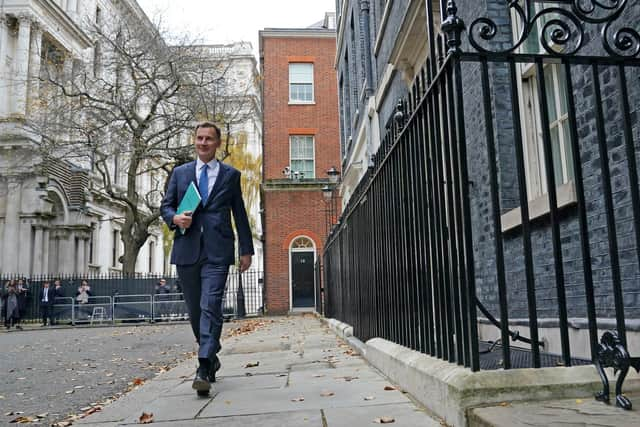In depth: trade bodies the Scottish Chambers of Commerce and Federation of Small Businesses outline recommendations for Spring Budget
Businesses in Scotland and across the UK more widely have set out their stalls, ahead of Jeremy Hunt's crunch Spring Budget next week, outlining key steps they would like to see announced at the despatch box to give the sector what they see as a much-needed lift.
The Chancellor is set to on Wednesday March 6 present what is seen as likely to be his final Budget before the next election, and after the news earlier this month that Britain’s economy contracted by 0.3 per cent in the final three months of 2023, and so entered a technical recession.
Advertisement
Hide AdAdvertisement
Hide AdThe Scottish Chambers of Commerce (SCC) has outlined its hopes with a view to backing business north of the Border “by working in partnership with industry to develop a long-term plan for growth. The trade body’s chief executive Dr Liz Cameron said: “Persistently high inflation, higher borrowing costs, frozen investment and ongoing global uncertainty are placing businesses under significant pressure. The Scottish business community is calling on the UK Government to work with us to reinvigorate growth and investment.


“Last year’s Autumn Statement suggested that the government is aware of this growth stagnation, through the move to make full expensing permanent. Now is the time to go further and help firms build towards the sustainable future that we all desire. Ahead of the next general election, this Budget must outline the long-term growth plan businesses sorely need to create jobs and unlock investment.”
The SCC has detailed its Budget recommendations, including a VAT cut for the hospitality, leisure, and tourism sectors to “boost spending, stimulate demand, and revive our towns and cities”. Cameron said: “The UK has one of the highest rates of VAT in Europe, which is a significant drag on our competitiveness on the world stage. Cutting VAT would reduce this drag, alleviate the cost burden facing firms, and allow those same firms to keep their prices more affordable for the public.”
The Scottish trade body would also like to see a topping-up of support for the Scotch whisky trade by cutting alcohol duty “to ensure the industry is competitive and is supported to grow, export, and create jobs”. Dr Cameron said the “prized” sector represents more than a quarter of all UK food and drink exports.
She added: “However, last year’s Spring Budget saw the industry hit with a 10 per cent tax increase, meaning that the average priced bottle faces a tax burden of 73 per cent. We now call on the government to rethink last year’s increase... to support one of Scotland’s truly world-leading industries that supports the wider UK economy and brings significant revenue to the Treasury each year.”


The call from the SCC – which says it represents more than 12,000 companies and at least half of Scotland’s private sector workforce – comes after the Scotch Whisky Association recently urged support from the forthcoming Budget as it revealed that the value of Scotch exports topped £5.6bn in 2023, although this along with volume was down on the previous year.
SWA boss Mark Kent at the time said: “A cut to spirits duty in the Spring Budget would be a step in the right direction, giving the industry platform at home to push forward with international growth. Government must also do away with any notion of restricting the marketing of Scotch whisky in Scotland, which would have a significant and lasting impact on the industry’s ability to generate future growth.”
The SCC is also urging Hunt to bin the energy profits levy, saying this would support the North Sea industry to recover lost investment and efforts to decarbonise, echoing a recent call from offshore industry trade body Offshore Energies UK, following plans revealed by Labour to increase this windfall tax and end “loopholes” allowing investment to be offset against taxation.
Advertisement
Hide AdAdvertisement
Hide AdThe final recommendation laid out by the SCC is what it describes as helping deliver the world’s most pro-enterprise tax regime, by introducing a new, internationally competitive, tax-free shopping incentive for overseas visitors, after the British Retail Consortium urged the reinstatement of tax-free shopping for international visitors to in part “restore the UK’s competitive advantage against European countries”. The SCC’s Dr Cameron has now said: “A new internationally competitive tax-free shopping scheme would help turbocharge the UK’s retail and hospitality sectors, bringing benefit to all corners of the UK through economic growth and tax revenue. It is estimated that such a scheme could bring as much as £10 billion pounds to the UK economy.”
The request for tax-free shopping for overseas visitors has also been made by the Federation of Small Businesses (FSB), “to motivate tourists to spend more in our shops and restaurants – this not only strengthens the supply chain, it also leads to increased revenue for the Treasury”. The trade body says the UK’s 5.8 million small businesses make up 99.3 per cent of all private sector firms.
FSB national chair Martin McTague said more broadly ahead of the Spring Budget: “Next week, the Chancellor must show the country he can take practical and credible steps to improve the environment for everyone who runs, works in, or uses small firms across the UK. We know that in times of recession, the more money small firms have to work with, the more chance the economy has of not only recovering – but recovering quickly.
“However, our research shows that small firms have been struggling for a lot longer than we’ve been in a recession for. Small business confidence has dipped below zero for seven consecutive quarters. Time is of the essence here, and the Chancellor should not pass up on the chance to bring in policies to improve cashflow. Any incentive to grow in these trying times should be at the forefront of priorities. It’s time to leave this period of economic downturn behind us.”
Comments
Want to join the conversation? Please or to comment on this article.